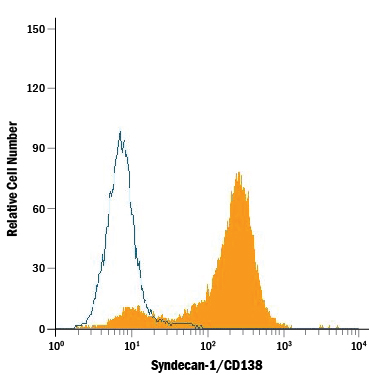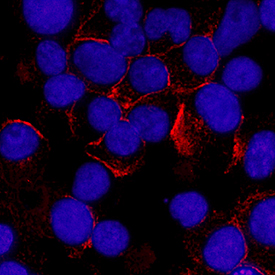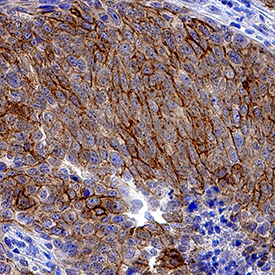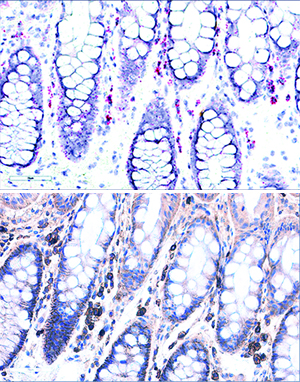Human Syndecan-1/CD138 Antibody Summary
Gln18-Glu251
Accession # NP_002988
Applications
Please Note: Optimal dilutions should be determined by each laboratory for each application. General Protocols are available in the Technical Information section on our website.
Scientific Data
 View Larger
View Larger
Detection of Syndecan‑1/CD138 in RPMI 8226 Human Cell Line by Flow Cytometry. RPMI 8226 human multiple myeloma cell line was stained with Rat Anti-Human Syndecan-1/CD138 Monoclonal Antibody (Catalog # MAB2780, filled histogram) or isotype control antibody (Catalog # MAB005, open histogram), followed by Phycoerythrin-conjugated Anti-Rat IgG Secondary Antibody (Catalog # F0105B).
 View Larger
View Larger
Syndecan‑1/CD138 in U266 Human Cell Line. Syndecan-1/CD138 was detected in immersion fixed U266 human myeloma cell line using Rat Anti-Human Syndecan-1/CD138 Monoclonal Antibody (Catalog # MAB2780) at 3 µg/mL for 3 hours at room temperature. Cells were stained using the NorthernLights™ 557-conjugated Anti-Rat IgG Secondary Antibody (red; Catalog # NL013) and counterstained with DAPI (blue). Specific staining was localized to plasma membrane. View our protocol for Fluorescent ICC Staining of Non-adherent Cells.
 View Larger
View Larger
Syndecan‑1/CD138 in Human Cervical Cancer Tissue. Syndecan-1/CD138 was detected in immersion fixed paraffin-embedded sections of human cervical cancer tissue using Rat Anti-Human Syndecan-1/CD138 Monoclonal Antibody (Catalog # MAB2780) at 1.7 µg/mL overnight at 4 °C. Tissue was stained using the Anti-Rat HRP-DAB Cell & Tissue Staining Kit (brown; Catalog # CTS017) and counterstained with hematoxylin (blue). Specific staining was localized to plasma membrane. View our protocol for Chromogenic IHC Staining of Paraffin-embedded Tissue Sections.
 View Larger
View Larger
Syndecan-1/CD138 in Human Colon Using Dual RNAscope®ISH and IHC. Syndecan-1/CD138 mRNA was detected in formalin-fixed paraffin-embedded tissue sections of human colon probed with ACD RNAScope®Probe (Catalog # 416961) and stained using ACD RNAscope®2.5 HD Duplex Detection Reagents (red, Catalog # 322500). Adjacent tissue section was processed for immunohistochemistry using R&D Systems Rat Anti-Human Syndecan-1/CD138 Monoclonal Antibody (Catalog# MAB2780) at 0.5 ug/mL for 1 hour at room temperature followed by incubation with the Anti-Rat IgG VisUCyte HRP Polymer Antibody (R&D Systems, Catalog # VC005) and DAB chromogen (brown). Tissues were counterstained with hematoxylin (blue).
Reconstitution Calculator
Preparation and Storage
- 12 months from date of receipt, -20 to -70 °C as supplied.
- 1 month, 2 to 8 °C under sterile conditions after reconstitution.
- 6 months, -20 to -70 °C under sterile conditions after reconstitution.
Background: Syndecan-1/CD138
Syndecan-1, designated CD138, is a dimeric type I transmembrane (TM) protein that belongs to the syndecan family of Type 1 transmembrane proteins (1, 2). The four syndecan family members are major carriers of heparan sulfate (HS) and chondroitin sulfate glycosaminoglycans (GAGs) that have different expression patterns and extracellular sequences. Syndecan-1 forms weak non-covalent homodimers, or heterodimers with Syndecan-2 or -3, through interactions of the transmembrane domain (3). It is synthesized as a 310 amino acid (aa) precursor with a 17 aa signal sequence, a 234 aa extracellular domain (ECD) that includes three closely-spaced consensus Ser-Gly HS attachment sites near the N-terminus, a 25 aa TM segment, and a 34 aa cytoplasmic region that includes a PDZ binding motif with a tyrosine phosphorylation site. The ECD is variably modified by GAGs, producing molecular weights of 120-200 kDa for native Syndecan-1. Soluble forms are shed via proteolytic cleavage. Human Syndecan-1 ECD shares 65-71% aa identity with the ECD of rat, mouse, canine, equine and bovine Syndecan-1. Syndecan-1 shows highest expression on epithelial cells such as keratinocytes, and terminally differentiated B cells such as plasma cells (4, 5). It aids wound healing in skin, cornea, and heart following myocardial infarction by promoting re-epithelialization, migration, and collagen deposition (4-8). It binds chemokines, creating chemotactic gradients when shed, but also binds and modulates integrins to control the influx of leukocytes (5, 7, 9). The net effect is to allow, but limit, inflammation. In myeloma and other cancers, shedding of Syndecan-1 can facilitate growth, angiogenesis and metastasis (10-12). Growth factors, such as FGFs and HGF, bind GAG chains and use Syndecan-1 as a coreceptor (12, 13). The GAG chains may also be used by a variety of viruses and bacteria for cell adhesion and uptake (4).
- Tkachenko, E. et al. (2005) Circ. Res. 96:488.
- Mali, M. et al. (1990) J. Biol. Chem. 265:6884.
- Dews, I.C. and K.R. MacKenzie (2007) Proc. Natl. Acad. Sci. USA 104:20782.
- Fears, C.Y. and A. Woods (2006) Matrix Biol. 25:443.
- Stepp, M.A. et al. (2002) J. Cell Sci. 115:4517.
- Ojeh, N. et al. (2008) J. Invest. Dermatol. 128:26.
- Stepp, M.A. et al. (2007) J. Cell Sci. 120:2851.
- Vanhoutte, D. et al. (2007) Circulation 115:475.
- Li, Q. et al. (2002) Cell 111:635.
- Beauvais, D.M. et al. (2009) J. Exp. Med. 206:691.
- Yang, Y. et al. (2007) J. Biol. Chem. 282:13326.
- Derksen, P.W.B. et al. (2002) Blood 99:1405.
- Su, G. et al. (2007) J. Biol. Chem. 282:14906.
Product Datasheets
Citations for Human Syndecan-1/CD138 Antibody
R&D Systems personnel manually curate a database that contains references using R&D Systems products. The data collected includes not only links to publications in PubMed, but also provides information about sample types, species, and experimental conditions.
2
Citations: Showing 1 - 2
Filter your results:
Filter by:
-
Mesothelial cells with mesenchymal features enhance peritoneal dissemination by forming a protumorigenic microenvironment
Authors: Yonemura, A;Semba, T;Zhang, J;Fan, Y;Yasuda-Yoshihara, N;Wang, H;Uchihara, T;Yasuda, T;Nishimura, A;Fu, L;Hu, X;Wei, F;Kitamura, F;Akiyama, T;Yamashita, K;Eto, K;Iwagami, S;Iwatsuki, M;Miyamoto, Y;Matsusaki, K;Yamasaki, J;Nagano, O;Saya, H;Song, S;Tan, P;Baba, H;Ajani, JA;Ishimoto, T;
Cell reports
Species: Murine polyomavirus strain A3
Sample Types: Whole Tissue
Applications: Immunohistochemistry -
Selective antisense oligonucleotide inhibition of human IRF4 prevents malignant myeloma regeneration via cell cycle disruption
Authors: PK Mondala, AA Vora, T Zhou, E Lazzari, L Ladel, X Luo, Y Kim, C Costello, AR MacLeod, CHM Jamieson, LA Crews
Cell Stem Cell, 2021-01-20;0(0):.
Species: Xenograft
Sample Types: Whole Tissue
Applications: IHC
FAQs
No product specific FAQs exist for this product, however you may
View all Antibody FAQsReviews for Human Syndecan-1/CD138 Antibody
Average Rating: 4.3 (Based on 3 Reviews)
Have you used Human Syndecan-1/CD138 Antibody?
Submit a review and receive an Amazon gift card.
$25/€18/£15/$25CAN/¥75 Yuan/¥2500 Yen for a review with an image
$10/€7/£6/$10 CAD/¥70 Yuan/¥1110 Yen for a review without an image
Filter by:










